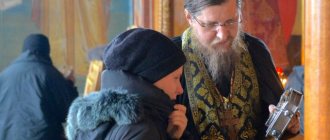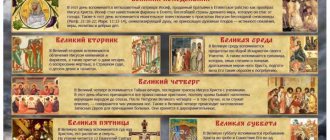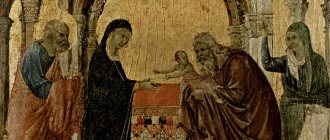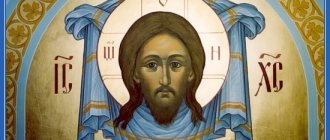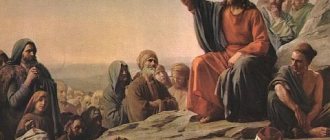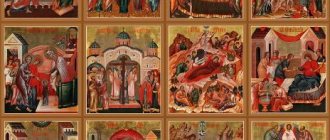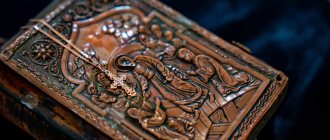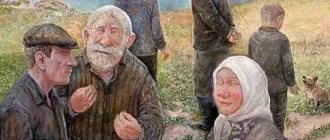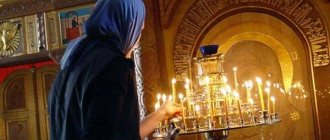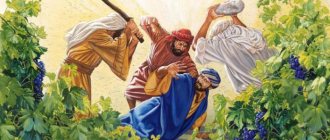Healing the paralytic. Story
There was a font in Jerusalem, which was called in Hebrew Bethesda, that is, the House of Mercy. Near her lay many sick, lame, dry people. Every summer, Archangel Michael went into the font and disturbed the water. And when the water was disturbed, the sick person who entered the font first after the Angel recovered immediately, no matter what his illness was. The place was so popular that until the 4th century, according to St. Cyril of Jerusalem (315-386), the sick constantly gathered there.
Once Jesus Christ was in Jerusalem during the Easter holiday. Passing by the font, He saw many sick people lying around it. Each of them waited for the minute when the Angel stirred the water so that he could be the first to enter the font. Among the other patients, there was one man who lay in relaxation for thirty-eight years. The Savior saw him and said to him: “Do you want to be healthy?” The sick man answered Him: “I want, Lord, but I do not have a person who would lower me into the font when the water is troubled: when I come, another one has already descended before me.” Jesus said to him:
Arise, take up your bed and walk (John 5:6-8).
The sick man immediately recovered, took his bed and went. The Jews who were there became angry and told the healed man that he should not take his bed, because it was a holiday. But he answered them: “He who healed me said to me: take up your bed and walk” (John 5:11). “Who is That Man?” - they asked. But he did not know that Jesus had hidden himself among the people. After some time, Jesus met this man in the temple and said to him:
Behold, you have now recovered; See that you sin no more, lest anything worse happen to you (John 5:12–14).
A WEEK ABOUT RELAXED
Because of the multitude of my illnesses in my heart, Your consolations have gladdened my soul.
(cf. Ps. 93:19), says the royal sufferer, the prophet David. He spoke generally about heart disease, about sorrows, but the truth of his words is most often experienced by those great patients who, with gratitude to God, endure severe bodily suffering. Let us remember our Kyiv wonderworker Pimen the Much-Sick: for twenty years he lay on his sick bed; He healed others of their illnesses, but not only did he not ask for healing for himself, but constantly thanked God for his illness: apparently, heavenly consolations really delighted his soul so much that he forgot about his illness and saw in it God’s special mercy for himself. "Mother! - one son said to his long-suffering mother, “don’t you grieve, don’t you get bored when you spend the long summer days while we all work in the fields?” “No, son,” she answered, “why grieve? The will of God!.. Yes, and it is a sin to grieve: how many mercies of God I have seen in my lifetime! Now the time has come to cheer for my sins; I lie down and remember my sins, I repent of them before the Lord God and thank His mercy that He did not destroy me with my iniquities, but punishes me like a father: isn’t this the mercy of God? Glory to Him the Merciful!” Thus, a humbly believing sufferer finds in the depths of his heart devoted to God great grace-filled consolation and lives with joy at the thought that for his patience he will be pardoned by God in the Future Life.
This is what the famous Svyatogorets says in his beautiful letters about one schema-monk, Fr. Pankratiya, who suffered from wounds on his legs for many years.
“Pankratia’s father, in the world Paramon, was a serf. As a child, a cruel mistress forced him to walk barefoot in deep autumn, when snow and ice already covered the ground, causing his feet to hurt greatly. The poor boy could not bear it: he secretly ran away from his mistress and at any cost decided to go beyond the Danube, and he actually left and remained for some time in the service of the Russians, who had also fled abroad. He became friends with a Little Russian who for some reason committed suicide. The sensitive Pankratius was greatly touched and amazed by the loss of his dear friend and, seeing how vain worldly life was, he abandoned it and retired to the Holy Mountain. Here, in Rusika, he found the desired peace of mind, despite the fact that his leg was already rotting from wounds that were the result of a severe cold in childhood. However, no matter how terrible the suffering of Father Pancras was, he rejoiced in spirit and often even said to me: “Believe me, I agree to rot with my whole body, I just pray to God to save me from heartache, because it is unbearable.” I told him: “I sometimes look at you and feel sorry for you: sometimes you are not yourself from internal unrest!” “Oh,” he answered, “if your heart hurts, it’s a disaster, it’s hellish torment! And my wounds, even if there were ten times more of them, are a wasteland: I will not rejoice over my illness, because, as I suffer, God comforts me. The heavier my leg, the more excruciating the pain, the more joyful I am, because the hope of heavenly bliss rests me, the hope of reigning in heaven is always with me. But it’s very good in heaven,” Pankraty sometimes exclaimed with a smile.
“How do you know this?” – I asked him one day. “Forgive me,” he answered, “I shouldn’t answer your question frankly, but I feel sorry for you when your soul is suffering, and I want to give you at least a little consolation with my story. You have seen how I suffer over time; oh, it’s not for nothing that I curl like a snake on my bed: it hurts, it hurts seriously, it hurts unbearably! But what happens to me after that, only it knows,” Father Pankraty mysteriously remarked, putting his hand to his heart. – Do you remember how I once, unable to bear the pain, tossed about on my bed, and even something similar to a murmur escaped from my lips. Finally, the pain subsided, I calmed down; you went away from me to your cells, and I laid my foot down and dozed off sweetly. I don’t remember how long I slept or dozed, I just saw a vision, and God knows what... Even now, as soon as I remember that vision, I feel an inexplicable, heavenly pleasure in my heart and would be glad to be sick forever, if only it would happen again, even if once in my life, this is an unforgettable vision for me: I felt so good then!” “What did you see?” - I asked Father Pankraty. “I remember,” he answered, “when I dozed off, a youth of amazing, angelic beauty came up to me and asked: “Are you in pain, Father Pankratiy?” “Nothing now,” I answered, “thank God.” “Be patient,” says the boy, “you will soon be free, because the Master bought you, and at a very, very high price”... “How? - I say, “am I bought again?” “Yes, bought,” the youth answered with a smile, “at a high price for you, and your Master demands you to Himself. Would you like to come with me? I agreed. We walked through some too dangerous places; huge dogs angrily rushed at me, ready to tear me to pieces; but one word from the youth - and they rushed away from us like a whirlwind.
Finally, we came out onto a spacious, clean and bright field, which seemed to have no end. “Now you have nothing to fear,” the boy told me, “go to the Master, Who, you see, is sitting in the distance.” I looked and really saw three People sitting next to each other. Amazed by the beauty of the place, I joyfully walked forward; people unknown to me in wonderful attire met and hugged me; many beautiful maidens, in white, regal attire, modestly greeted me and silently pointed into the distance where the three Strangers were sitting. When I approached those sitting, two of Them stood up and stepped aside, and the Third was waiting for me. In quiet joy and some kind of trepidation, I approached Him. “Do you like it here?” – the Stranger asked me. I looked at His face: it was bright; royal grandeur distinguished my new Master from ordinary people. Silently I fell at His feet and kissed them; there were wounds all over the legs. After that, I respectfully folded my hands on my chest and asked permission to press His right hand to my sinful lips. Without saying a word, He handed it to me. There were equally deep wounds on His hands. I kissed the right hand of the Stranger several times and looked at Him in quiet, inexpressible joy.
My new Master's features were amazingly good; they breathed meekness and compassion, a smile of love, greetings were on His lips; His gaze expressed the imperturbable calm of His heart. “I bought you from your mistress,” the Stranger began to tell me, “now you are forever Mine. I was sorry to see your suffering; your childish cry reached Me when you complained to Me about your mistress, who tormented you with hunger and cold, and now you are free forever. For your suffering, this is what I am preparing for you!”
And the wondrous Stranger pointed me into the distance: it was very light there; beautiful gardens, in full bloom, were pictured there, and a magnificent house glittered under the heavenly shadow. “It’s yours,” continued the Stranger, “but it’s not quite ready yet: be patient. When the time for your rest comes, I will take you to Me; and now stay here, look at the beauty of your place, be patient until the time comes: the one who endures to the end will be saved!
(Matt. 10:22).” "God! “I exclaimed, beside myself with joy, “I’m not worth such mercy!” And I threw myself at His feet, kissed them, but when I got up, there was no one and nothing in front of me.
I woke up. There was a knock on the board in our monastery: they were striking for matins. I stood up quietly to pray. It was very easy for me, but what I felt, what was in my heart, is my secret. I would give thousands of years of suffering to repeat such a vision. It was so good!”
Healing the paralytic. Divine service
The theological meaning of the miracle of Jesus Christ healing the paralytic from the Gospel narrative is revealed in the liturgical texts (in the stichera, the canon, in the Synaxar), which are heard during the service on this day. Comparisons are made in liturgical texts between the Angel’s descent into the Sheep Pool and the healing received from the disturbance of the water from the descent and Christ. If the Angel descended only once a year and only one person received medical help, then God the Word, by his descent to earth through His Crucifixion and Resurrection, gave Holy Baptism to all people, which, according to the faith of the baptized, is capable of healing any person from illnesses, both mental and and bodily.
Sometimes an angel came into the sheep's font, and healed only one for every year, but with divine baptism Christ now cleanses the countless multitudes (Triodion Colored, canon of the day, hymn 1)
Troparion:
May the earth be joyful, and the earth rejoice, and create2 a power with your power, having corrected death by death, the firstborn and3death, and the womb of God, and3 delivered us, and3 given to us1 Have great mercy.
Kontakion:
I love my2 hearts of all things, I am weakened by the placeless desnim of love, I will raise up the divine with2 all my love, as well as the3 weakened ones I have raised up from the3si2 ancient times, and call us to save, generous xrt E, give me2 and3healing.
Library of the Russian Faith Canon for the week about the paralytic →
Read online
Healing the paralytic. Icons
The iconography of the healing of the paralytic is an image of Jesus Christ healing the paralytic near the font, around which the sick lie, “waiting for the movement of the water.” The healed man is depicted with his bed, which he holds on himself.
Jesus Christ heals the paralytic. Pool of Bethesda in Jerusalem. Miniature from the Four Gospels of Tsar Ivan Alexander of Bulgaria. 1356
Jesus Christ heals the paralytic. Painting of the Transfiguration Cathedral of the Mirozh Monastery. Pskov, approx. 1156
Healing of the paralytic at the Sheep's font. Icon, second quarter of the 15th century. Sergiev Posad State Historical and Art Museum-Reserve
Healing the paralytic. First half of the 17th century Semyon Borozdin, State Russian Museum
Healing the paralytic. Paintings
World painters such as Bartolome Esteban Murillo (1617-1682), Johann Friedrich Overbeck (1789-1869), Giacomo Palma (the younger) 1544 (according to other sources 1548/50) - turned to the Gospel story about the healing of the paralytic. 1628)), N.A. Bruni (1856-1935) and others.
Healing of the paralytic at the Sheep's font. Bartolome Esteban Murillo. 1667-70
Healing the paralytic. Johann Friedrich Overbeck. 1868 Hamburg. Kunsthalle, Engraving cabinet
Healing of the paralytic at the Sheep's font. Giacomo Palma, 1592
Healing the Paralytic (Sheep Pool). ON THE. Bruni, 1884-1885
Russian Orthodox Church
On May 7, 2022, on the 4th Sunday after Easter, about the paralytic, His Holiness Patriarch Kirill celebrated the Liturgy at the St. Nicholas Stauropegial Monastery. At the end of the service, the Primate of the Russian Church addressed the believers with a sermon.
In the name of the Father and the Son and the Holy Spirit!
Today's post-Easter Sunday is called the Sunday of the Paralytic, because it is on this day that the well-known Gospel account of the healing of the paralytic at the Sheep Pool in Jerusalem is read (John 5:1-15). Every year a miracle took place there - an angel of the Lord disturbed the water, set it in motion, and those suffering from various ailments rushed into this pool, because healing extended to the one who first stepped into it.
One can imagine how hard it is for a suffering person to concentrate all his strength in order to be the first to reach the coveted water. Why did the Lord arrange it this way? But because these efforts showed people’s faith, their determination, their hope for healing. Anyone who could not or, perhaps, was too lazy to show due diligence, who did not have the patience to wait for this miracle, it is not known on what day it would come, did not receive healing. And the paralyzed man, that is, the paralyzed man, had no chance at all to be the first to plunge into the font, because he was unable to move on his own, and for 38 years no one showed any desire to help the unfortunate man enter the healing waters. But the Lord Jesus Christ heals this man.
Gospel reading gives us the opportunity today to think about whether there is any meaning in human illnesses. Maybe this is just an unfortunate combination of physical or genetic circumstances, a consequence of everyday failures? Or maybe illness is nonsense? After all, illness takes a person out of everyday life and limits his capabilities. What use can there be in immobilized people? What benefit could there be from everything that fell on their heads for some unknown reason?
We find wonderful words from St. Basil the Great: “The body is destroyed so that the soul can be saved.” This is the answer to all those who do not see the meaning in illness and sorrow, who consider it an accident, a misunderstanding, or simply a consequence of the insufficient development of medical science, which, in the minds of such people, will someday cure a person from any disease. But today the most insightful scientific minds, including in the field of medicine, doubt this prospect, because rapid scientific and technological development is accompanied by the emergence of new terrible diseases that no one could have imagined yesterday, and the forces that are inherent in human the body, which we used to call immunity, stops working. What happens to a person gives reason to believe that, despite the absolutely remarkable development of medical science, which really helps to live longer and be healthier, disease will never go away from human life. And this can only be explained by the fact that illness is a certain factor promoting a person’s spiritual growth. “The body is smitten, and the soul is saved.” And why? But because in illness a person realizes his limitations. In illness, a person needs help, like a paralytic who could not go down into the waters of the Sheep Pool on his own. Someone had to help him, which means that the paralytic lived, aware of his absolute limitations.
What happens to a person, his consciousness, his psychology under these conditions? The path of complete despair is possible: I am limited, I can’t do anything, I don’t see, or I don’t hear, or I can’t move, or the pressure rises so much that I can’t work, or I lose my presence of mind from a nervous reaction to the environment - but you never know , what can happen! People suffer from all this, but, on the other hand, a person who is aware of his limitations will not commit the most terrible sin. He will not perish spiritually from pride, because pride, in which the very essence of sin is manifested (for the devil is the father of pride), always stems from the consciousness of strength, power, abilities, external data, from the position that we achieve in society.
Illness puts a person in his place like nothing else. A sick person has a need to put someone else at the center of his life, just as a paralytic needed someone who could help him descend into the saving waters. Maybe this is an excellent doctor on whom the patient begins to rely, or loved ones who share his grief. The patient seems to take his own “I” out of the center of life and surrender this center to another. He begins to live, willingly or unwillingly, according to the commandments of Christ. But all the commandments are violated because we put ourselves at the center of life instead of God and our neighbor and direct all our strength to serve only ourselves, our prosperity, our career, our enrichment, and the acquisition of power. But the patient no longer needs all this. He doesn't think about his career, he doesn't think about power. He is freed from many sins, but, most importantly, in need of help, he places someone else next to him, not so much physically as spiritually. How sick people look at someone who comes to their bedside to help them - with joy, with hope! The light in the window is a person coming to a sick person...
But none of the people helped the paralytic at the Sheep's font. God helped him. And, perhaps, the greatest and most beautiful thing that happens in the mind of a sick person is when he realizes that his life is in the hands of God. This occurs when a person realizes that his illness is fatal. I have to visit hospitals from time to time, both for adults and children. Most often I meet with those who suffer from just such diseases. If these are children, then I feel like I’m in heaven among them. These are holy children, and they are surrounded by holy parents who do not abandon these children, do not abandon them, but fight for their lives, mobilizing all possible forces that are subject to them; and most often it is there that you meet with enormous power of prayer. All these people give up the central place in their lives to God - “the body is destroyed so that the soul can be saved.”
Many holy fathers call illness a Divine visitation. If a person is always healthy, if he never feels his limitations, then this can also stem from abandonment of God, especially if the person is evil, does nothing good, enjoys his central place in life, pushes others with his elbows, tramples underfoot, makes a career or fights for enrichment by any means. Such a person has no internal forces that could save him. He is a dying man. And if the Lord wants to save him - perhaps through the prayers of his parents, living or deceased, through the prayers of loved ones, who sometimes suffer greatly from such a person - then salvation does not occur without illness. Sometimes this illness is spiritual, a failure in one’s career, the realization that everything one has served is dust and brings no benefit, and sometimes it is a physical illness that leads to a change in the soul of the sick person.
The Lord is a loving Father. He doesn't want anyone to die. For the sake of our salvation, He does not break our nature, our freedom, He does not turn us into cogs of some huge machine. Each of us is free, for we are created in the image of God. But because of love, the Lord often extends His saving hand to us, and sometimes through illness leads to a rethinking of life and to finding ways to salvation.
Today is filled with all these meanings. And the conclusion is very simple: we should never despair when illness visits us. We, of course, must use modern means of treatment, consult doctors, but if we ever feel that medicine is unlikely to be able to help us, then there should be no despair, but we just need to remember the words of St. Basil the Great “The body is damaged in order to be saved.” soul". And may the Lord help us to meet difficulties in our lives in this way, including physical weakness. Amen. Christ is Risen!
Press service of the Patriarch of Moscow and All Rus'
